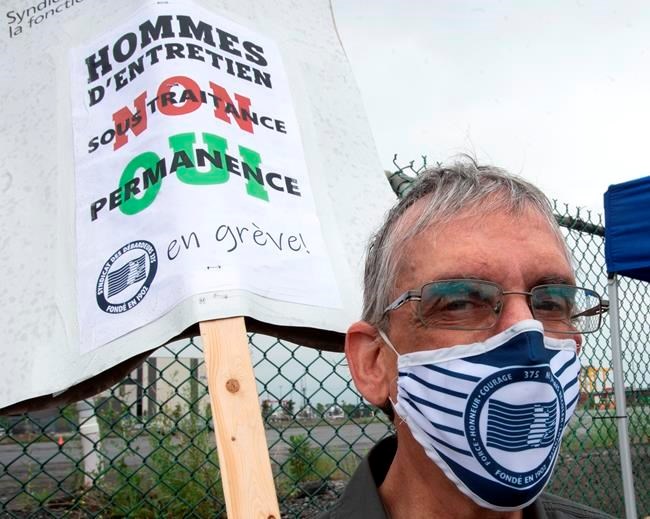Montreal dock workers plan to launch a port-wide strike without an end date starting Monday, the latest move in an escalating standoff between the union and the Maritime Employers Association.
The announcement Friday builds on a series of temporary strikes by the Canadian Union of Public Employees over the past month that have diverted several ships to ports in Halifax, New York City and Saint John, N.B.
"The ball is in the bosses' court," union spokesman Michel Murray said at a press conference Friday, several hours after CUPE filed notice of the indefinite general strike.
The plan will be set in motion if "no truce agreement" is reached by Sunday, he said.
The Maritime Employers Association said in a release it is "disappointed" that "even after 65 negotiation sessions since September 2018, we are still at an impasse."
Association CEO Martin Tessier said he has proposed a counter-offer to negotiate in good faith over the next 45 to 60 days, culminating in binding arbitration if the two sides remain at loggerheads.
The union has rejected the offer, he said.
Union members say they will not provide mooring services during the work stoppage, except for grain vessels and supplies to Newfoundland and Labrador in order to comply with the federal labour code and a decision rendered by the Canada Industrial Relations Board, respectively.
A port shutdown would disrupt the flow of medical supplies, automotive parts and myriad other goods and wind up raising prices for consumers, Tessier said.
"The auto industry, they are yelling big-time right now. And even safety equipment linked to COVID-19, the PPE — the personal protective equipment — and drugs and medical equipment will slow down."
The fast-paced, tightly synchronized flow of just-in-time logistics could magnify the impact of any derailments for shippers.
"Instead of going through the Port of Montreal you need to go through New York. Then you need to use longer routes, trains. That is going to increase the costs," Tessier said in an interview. "Who's going to pay at the end of all that? Probably you and I."
The CUPE labour action revolves largely around wages, scheduling and work-life balance, with longshoremen routinely working 19 days out of 21 due to heavy traffic through the port, according to the union.
The 1,125 longshoremen, foremen and maintenance workers on the waterfront in Montreal have been without a collective agreement for nearly two years.
The port has hired about 300 workers over the past 18 months to handle the volume increase, Martin said. Those who do not wind up working all 19 days are compensated for the time they are on call.
In 2015, longshoremen across Quebec earned an average of $110,000 before benefits, according to figures from the province's labour ministry. The benefits package for Montreal longshoremen amounts to $22,000 annually, including a defined-benefit pension plan paid for by the employer.
Tensions between the two parties have ratcheted up in July and August.
On Monday, the employer association informed the union it would cut overtime rates for work during evenings, weekends and nights, as the number of those shifts had increased due to daytime strikes in the preceding weeks.
Last week, police launched an investigation into a confrontation between dock workers and port managers that erupted in violence at a parking lot where executives were exiting a shuttle bus.
Montreal police received a call at around 7 p.m. on July 29 and said several managers were punched and had phones or wallets stolen.
The broader showdown between management and union follows a 21-month battle over the definition of "essential service" amid negotiations for a new collective agreement.
The Canada Industrial Relations Board concluded in June that the employers association had not demonstrated "imminent and serious risks to the health and safety of the public" — the criteria for an essential service — in the event of a strike.
The Maritime Employers Association had asked the board in October 2018 to review whether longshoremen carry out essential work in a bid to shield the docks from strike threats.
Margot Young, a law professor at the University of British Columbia, said the employers are trying to have it "both ways."
"If it's such essential, important work, then the pay should actually reflect that," Young said. "'You're overpaid, so don't ask for more. But oh, you're so essential that you can’t go on strike.'
"Its a demanding job, and there's some risk involved," she added.
Tessier of the employers association said Labour Minister Filomena Tassi told him a federally appointed mediator was not an option at the moment.
"She told me she would not get involved. ‘Work harder, be more focused and negotiate a deal.'"
This report by The Canadian Press was first published Aug. 7, 2020.
Christopher Reynolds, The Canadian Press

